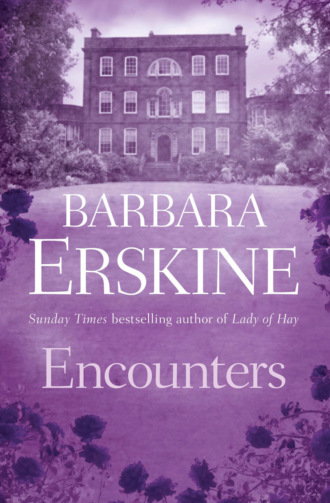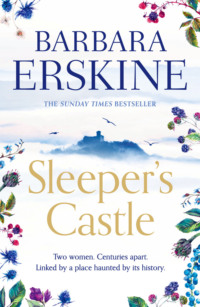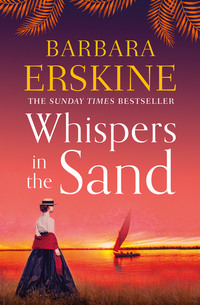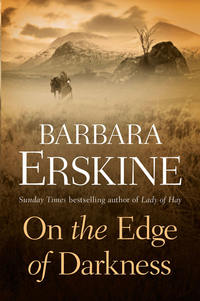
Полная версия
Encounters



Copyright

Published by HarperCollinsPublishers Ltd
1 London Bridge Street
London SE1 9GF
www.harpercollins.co.uk
First published in Great Britain by Michael Joseph Ltd 1990
This edition published by Harper 2017
This collection © Barbara Erskine 1990 and as follows:
‘Cabbage a la Carte’ (Woman’s Weekly) 1976; ‘Feline Express’ (New Love as ‘Cupid Was A Kitten’) 1978; The Consolation Prize’ (Women’s World as ‘A Loving Invitation’) 1984; ‘There was a time when I was almost happy …” (Woman’s World) 1979; ‘Summer Treachery’ (Rio) 1981; Trade Reunions’ (Best) 1988; ‘The Bath: A Summer Ghost Story’ (Living) 1987; ‘The Green Leaves of Summer’ (Woman’s Own Summer Stories) 1979; ‘Encounters’ (Woman’s World) 1977; The Touch of Gold’ (The Writer) 1976; The Helpless Heart’ (Woman’s World as ‘Give Me Back My Dreams’) 1978; The Indian Summer of Mary McQueen’ (Secrets) 1980; ‘The Magic of Make Believe’ (Woman’s World) 1984; ‘A Summer Full of Poppies’ (Secret Story, Robinson) 1989; ‘A Face in the Crowd’ (Woman’s World as ‘Forsaking All Others’) 1983; ‘Flowers Shouldn’t Make You Cry’ (Woman’s World) 1979; ‘Someone to Dream About’ (Woman’s World) 1986; ‘Milestones’ (New Idea) 1980; ‘Marcus Nicholls’ (Red Star Weekly as ‘Windows on the Past’) 1980; ‘A Quest For Identity’ (Woman’s World) 1977; The Heart Will Understand’ (Woman’s World) 1980; ‘A Stranger With No Name’ (Woman’s World) 1980; ‘Just An Old-Fashioned Girl’ (Woman’s World as ‘Love Never Changes’) 1981; ‘All This Childish Nonsense’ (Woman’s World as ‘A Promise is Forever’) 1977; ‘A Love Story’ (My Story) 1976; ‘A Promise of Love’ (Woman’s World as ‘Don’t Tread On My Dreams’) 1978.
Cover layout design © HarperCollinsPublishers Ltd 2017
Cover images © Shutterstock.com
Barbara Erskine asserts the moral right to be identified as the author of this work.
A catalogue copy of this book is available from the British Library.
This novel is entirely a work of fiction. The names, characters and incidents portrayed in it are the work of the author’s imagination. Any resemblance to actual persons, living or dead, events or localities is entirely coincidental.
All rights reserved under International and Pan-American Copyright Conventions. By payment of the required fees, you have been granted the non-exclusive, non-transferable right to access and read the text of this e-book on screen. No part of this text may be reproduced, transmitted, down-loaded, decompiled, reverse engineered, or stored in or introduced into any information storage and retrieval system, in any form or by any means, whether electronic or mechanical, now known or hereinafter invented, without the express written permission of HarperCollins.
Source ISBN: 9780008180904
Ebook Edition © January 2017 ISBN: 9780007466351
Version: 2017-09-07
Table of Contents
Cover
Title Page
Copyright
Preface
A Step Out of Time
Visitors
Cabbage à la Carte
Metamorphosis
Feline Express
The Consolation Prize
The Valentine’s Day Plot
‘There Was a Time When I Was Almost Happy …’
Summer Treachery
Trade Reunions
All You Need to Do Is Smile
The Bath – a Summer Ghost Story
A Private Ceremony
The Green Leaves of Summer
Encounters
The Touch of Gold
The Helpless Heart
The Indian Summer of Mary McQueen
The Magic of Make Believe
Destiny
A Summer Full of Poppies
A Face in the Crowd
A Woman’s Choice
Flowers Shouldn’t Make You Cry
Footsteps in the Attic
Someone to Dream About
A Fair Revenge
Milestones
The Magic Carpet
The Proposal
Spaces
Marcus Nicholls
Salesmanship!
A Quest For Identity
Such a Silly Thing
The Heart Will Understand
Party Games
A Stranger With no Name
Just an Old-Fashioned Girl
All This Childish Nonsense
A Love Story
A Window on the World
A Promise of Love
Excavations
Keep Reading Barbara Erskine’s Novels
Keep Reading Sleeper's Castle
About the Author
Also by Barbara Erskine
About the Publisher
Preface
I have always loved reading short stories and, like many authors, tested my literary wings experimenting with them. At first glance anyway, the short story seems an easy route for the beginner, largely because it is, axiomatically, short; one is not aiming for some distant horizon two or three hundred thousand words away. Short stories are self contained, feisty, fun; they are tricky, challenging – compact crystallizations, each of which must have as much substance in its own way as its big brother, the novel.
Having started to write them, hooked by the lure of so many plots, so many characters, so many scenes and the technical challenge of construction, I have found that I cannot resist the form, and this selection is taken from the hundreds I have written over the past fifteen years.
I did not plan to be a short story writer. I wanted to be a novelist – specifically a historical novelist – and it was years ago while a student at university in Scotland that I decided to write my first novel, the story of Robert the Bruce and the woman who set the crown of Scotland on his head. Consumed with excitement as I worked on the outline, spending much more time on it than I did on my studies, I visited the sites of the story and, absorbing the atmosphere, walked alone along mist-shrouded rivers and around the remains of countless castles. I wrote several thousand words, then I stopped. I realized I couldn’t go, on. I hadn’t the experience of writing or of life to cope with the huge task I had set myself. Quietly and sadly I put my manuscript away. I knew I would write it one day – but not yet. (That book eventually became Kingdom of Shadows and, secretly, I incorporated those few thousand words unchanged into it – a debt to that student writer who had felt Robert and Isobel’s suffering but had not then been able to put it down on paper.)
My confidence was shaken. I had wanted to be a writer since I was three years old and yet I had fallen at the first major fence. It was a case of wanting to run before I could walk. Obviously I had an apprenticeship to serve and so came the idea of trying to write short stories. I studied the markets and began to write articles and stories to fit those markets. Miraculously the first story I wrote was accepted and published by the London Evening News. I was much encouraged!
It was when we went to live in the Welsh Borders that again the longing to write historical fiction grew too strong to resist and I recognized consciously for the first time that I was one of those writers for whom the spirit of place is all important. The land around me, the hills, the forests, the seas, evoke echoes I cannot ignore. I have to write about them. I have to try and make my readers see and hear and even smell the landscape and its history as I see and hear and feel it.
Once more I began to plan a novel and this time I felt I had the experience and the confidence to do it. Not the story of Robert and Isobel – I still wasn’t ready for that – but a novel of history and passion and mystery which was born of the mysterious, ancient landscape around me.
While I read and researched and visited the sites which were to become the background for Lady of Hay I went on writing short stories and, eventually, half a dozen short historical romances as well, perhaps to complete my apprenticeship before at last I could start writing the big novel.
But by now I enjoyed writing short stories too much to stop. Heavily involved in a book full of passion and hatred and fear it is nice to come up for air from time to time to write a humorous story, or an unashamedly sentimental one; a modern thriller or a plain old-fashioned love story, and I have chosen some of each of these for this collection. There are also, of course, ghost stories and a couple of stories where the past and the present slide together and the curtain which separates us from the past is temporarily drawn aside. Most of the stories are about places as much as about the people who find themselves within them, and most of them are, in one way or another, about encounters. I hope you enjoy them.
Barbara Erskine
Great Tey, 1989
A Step Out of Time
The house at the end of the long, winding drive was elegant Georgian. The windows, all perfectly proportioned, looked out across sweeping lawns – not quite as smooth as they might have been, but nevertheless beautiful – towards the Black Mountains, brooding in the heat haze of the August afternoon.
Looking through the windscreen Victoria tried to suppress the quick catch of excitement which she felt in her throat. They had already seen so many houses which looked idyllic. Before there had always been a snag. This house, she felt suddenly, would be right; it was as if, in some secret part of herself, she knew it already. She glanced at Robert and saw that he felt it too: the hope, the anticipation, the agitation. When they found the right house it was going to be very special. Their home. The first since he had come out of the army. The place where they could start their new life.
The young man from the house agent was waiting for them, standing beneath the porticoed entrance proprietorially jangling the keys as they drew to a halt. Robert glanced at Victoria and winked as he set about climbing stiffly out of the car. She fumbled with the door handle, not wanting to watch, knowing better than to help. Each time it was easier. Each time it hurt him less. Each time the excitement that this might be The House helped.
They shook hands and the agent, introducing himself as William Turner, inserted the key in the lock and pushed open the heavy door. Beyond it a cavernous hall opened up, elegantly if sparsely furnished, with at the far end of it a graceful staircase winding up to a galleried landing. There was a faint smell of dogs.
‘Lady Penelope is away this weekend.’ William’s voice was reverently hushed. ‘So we can go all over the house as we like.’
They followed him soberly from drawing room to dining room to sitting room to morning room – a room for every hour of the day – and on through to the large north-facing kitchen.
‘Not modernized, I’m afraid.’ William looked round in barely disguised disgust at the unmatched cupboards, the painted deal table and the small electric cooker. The water, Victoria noted with amusement, ran from an old wall-mounted water heater into a deep stone sink.
William was watching her. He gave a broad smile. ‘Grim, isn’t it?’
‘It is rather.’ Victoria liked the young man. He had not mentioned exotic fitted kitchens; he did not pretend it had been left like this for the convenience of the buyer. Besides, after the initial shock, she loved it. The kitchen had a quaint, old-fashioned charm.
‘What’s through there?’ Robert nodded towards one of the internal doors. Beneath the grubby roller towel he had seen a key and three bolts. Three bolts seemed excessive for a door into a larder.
‘Ah.’ William gave his most charming professional smile, followed by a deprecatory shrug of the shoulders. ‘Well, every house has a few drawbacks.’
‘Oh?’ Robert glanced at Victoria. His heart, like hers, had sunk. He flipped through the glossy brochure in his hand. ‘No mention of any drawbacks here.’
‘Perhaps you’d like to see the upstairs first? The principal bedrooms have glorious views across into Wales,’ William said hopefully. He had seen how they felt about the house; he had seen her growing secretly more and more excited. He should have told them from the first. He glanced at them sympathetically. Robert Holland was tall, distinguished, in his late forties perhaps, his upright military bearing marred by an awkward limp. His wife was much younger, attractive, dark haired; slightly reserved, he guessed. The kind he thought of as deep and therefore probably interesting. He prided himself on his character analyses of potential clients. These people were understated, but that did not mean they weren’t wealthy. He had learned that one very early in his career. Money, particularly old money, did not always show. It was new money that liked to flaunt it. They could afford the house; he knew already that they would not buy it.
‘I think we should see the drawbacks first, don’t you?’ Victoria put in firmly.
‘You’re sure?’ His humorous smile was putting them all on the same side – allies against whatever eccentricity was the other side of the door. It also helped to hide his fear.
The key was stiff and the bolts unyielding. He had opened the door some half a dozen times now, but it never grew any easier and he could never overcome his reluctance to go through it. When at last he managed to push it open they peered into a long dark passage. ‘This,’ he said dramatically, ‘is the west wing. Lady Penelope seals it off more or less completely. I think she prefers to forget it’s there. To be honest, the best plan would be to demolish it.’
They could all feel the cold striking up from the dirty stone floor. The rest of the house was hot and airless in the humid summer heat but here it was abnormally cold.
Victoria felt her mouth go dry. Suddenly her optimism and her excitement had gone. ‘I don’t suppose there is any reason to see it if it’s that bad …’ she said uncertainly. A tangible feeling of dread seemed to surround her, pressing in on her from the cold walls.
‘Nonsense.’ Robert stepped into the passage. ‘What’s wrong with it? Dry rot? Again?’ The again was for William’s benefit. It might help to knock a thousand or so off the asking price.
‘No, not dry rot.’ William glanced at Victoria. He gave a tight protective smile as he saw that she had grown pale. About half of his clients seemed to feel it. The other half walked through without any comment, but even they hurried. He motioned her through ahead of him and reluctantly followed her.
With a quick, doubtful look at him she stepped into the passage after Robert. He had pushed open the first door on the left. Sunlight flooded across the empty room and into the corridor showing up the dust and scattered newspapers on the floor. ‘It’s a good sized room.’ Robert walked across to the window, his shoes sounding strangely loud on the bare boards. He peered out. ‘That must have been a formal garden once.’
‘It still could be.’ William was standing near the door. ‘It only needs tidying up. There are seven acres here. The grounds are one of the best features of the house.’
‘Why is there no mention of this room here?’ Robert had turned back to his brochure. The inconsistency irritated him. He wanted room dimensions and particulars at his finger tips.
‘There is.’ Almost reluctantly William went over to him. He riffled through the pages and stabbed at one with an index finger. ‘There. “Behind the kitchen quarters there is an unconverted wing with the potential for fourteen extra rooms”.’
‘Fourteen!’ Victoria exclaimed in dismay. ‘But that would make the house enormous. Much too big.’
‘It does seem a lot, doesn’t it?’ Once more the disarming charm. ‘The wing was added about a hundred years ago. As I said, I don’t believe anyone ever uses it.’ He glanced over his shoulder uncomfortably. The feeling was worse today; it was beating against his head like the threat of a migraine – fear and pain and nausea, gripping him out of nowhere. He swallowed hard, trying to stop himself retching. ‘Look, Mr and Mrs Holland, would you mind if I left you to wander round for a few minutes. I have to make a phone call from the car …’ He didn’t wait for their reply. Already he was edging out of the room and back along the passage towards the kitchen.
Robert ignored him, but Victoria watched him disappear, fighting the urge to follow him. ‘He doesn’t like it through here, does he?’ she said softly.
‘It does have a bit of an atmosphere.’ Robert squared his shoulders. ‘You want to see it, though, don’t you? I suggest we hurry round this bit, see the upstairs, then we can drive off somewhere and have tea. I’m frozen.’
‘So am I.’ Victoria shivered. ‘And it’s about 80° out there.’
‘It must be damp in this bit of the house.’ Robert walked back into the passage and peered through the next doorway. ‘Another good sized room. And another. Good God, look!’
Victoria stared over his shoulder nervously. In the corner of the room was an enormous heap of old tin hats. Opposite them, near the window, a dozen long poles were stacked in the corner.
‘Those hats must have been here since the war.’ Robert picked one up.
‘Don’t touch them!’ Victoria was suddenly frightened. ‘Please don’t touch them. Let’s go. I don’t like it here either.’ She could feel the unhappiness, the desperation. It seemed to pervade the room.
‘Don’t be silly. We must see it all now we’re here. Look, the stairs are along here.’
‘No, Robert. Please.’ She felt panic clutching at her throat. ‘Don’t go upstairs. Don’t …’
‘Victoria!’ He stared at her in astonishment. ‘OK. You go back. Go and look at the garden with young Mr Turner. I’ll have a quick shufty up here and then I’ll come and find you, OK?’
‘Robert …’ She raised her hand as if to stop him but already he had set off up the steep stairs, awkwardly pulling himself up by the handrail.
She took a deep breath. At the foot of the stairs a door led out onto the old terrace. She rattled the handle, not expecting it to open, but to her surprise it turned easily. It had not been locked.
The heat in the garden hit her like a physical blow. After the unnatural cold in the house it was wonderful. She threw her head back and raised her arms towards the sun with relief, then abruptly she dropped them to her sides. There was a young man standing on the terrace. Dressed in shabby corduroy trousers and an open-necked shirt, he had his arm in a sling. He turned and grinned at her.
‘Hello.’
Victoria smiled back. ‘I’m sorry. I didn’t know there was anyone else here.’ She was embarrassed, and at the same time relieved to see him. After the silence and the oppressive atmosphere of the west wing it was wonderful to see another human being. ‘Are you looking round too?’ she asked. She paused and found herself staring at him again. She knew him. Confused, she fumbled for a name, but none came. She couldn’t place him.
‘Looking round?’ He looked puzzled. ‘No. I live here. For the moment.’
‘Oh, I’m sorry.’ She was still desperately trying to think where she had met him before. ‘We understood the place was empty.’
‘Empty!’ He seemed to find the word ironic. ‘Well, I suppose it is in a way. I hate it in there. It’s so cold, did you notice? However hot it is out here. As cold as the tomb.’ He shuddered. ‘Why were you staring at me?’
She hastily looked away. ‘I’m sorry, but we’ve met before somewhere, haven’t we?’
He was the most attractive man she had ever seen. Shocked at her own reaction, she was trying to cope with the sheer physical impact he had on her. It confused and frightened her.
He didn’t seem to have heard her question. He was concentrating on the flower bed near them. And he obviously hadn’t seen the admiration in her eyes, for when he glanced back at her he scowled. ‘Not a pretty sight, am I?’ He half raised his injured arm. ‘Don’t look at me. Wouldn’t you like to see the garden?’
‘Yes. Please.’ Desperately she tried to get a grip on herself. Middle aged – well, nearly – women did not go round the country ogling handsome young men and feeling their breath snatched away by waves of physical longing for complete strangers. She concentrated hard on the flowers, as he seemed to be doing, hoping he had not noticed her confusion. ‘The garden is very beautiful.’ She hoped that her voice sounded normal. ‘Mr Turner told us it had gone wild, but it seems very neat to me.’ A crescent of rose beds curved around the neatly mown lawn, brilliant with flowers; beyond them a herbaceous border stretched towards the cedar tree, a riot of lupins and gladioli and hollyhocks.
The young man glanced at her and smiled. ‘A few of the chaps work on it when they’ve got the strength. I’m not much good. I can’t keep my balance without this damn thing.’ As he turned to step off the terrace onto the soft mossy lawn she saw he was using a stick.
‘You look as though you’ve really been in the wars,’ she said gently.
He frowned. ‘Who hasn’t? But I’m lucky, I suppose. I made it back. Look. Look at the roses. God, they’re lovely.’ He stopped and stared at them with a strange intensity.
There was a long silence. Victoria felt uncomfortable, as though she were in the way. He had withdrawn from her into some unfathomable pain. Glancing nervously back at the house, she remembered Robert suddenly and wondered where he was. She wished he would come. He had been there: through the fear and resentment; he knew how to cope with pain.
The house on this side was smartly painted. She frowned. Several windows stood open and from somewhere she could hear the sound of music – a band playing on a scratchy record. Staring up at the windows, hoping to see Robert, she glimpsed a shimmer of white at a window. Her exclamation of surprise brought the young man’s attention back to her.
‘What’s wrong?’
‘I thought I saw someone up there. Someone in white.’
He gave a strained smile. ‘Probably one of the nurses.’
‘One of the nurses?’ She stared at him. ‘Do you have nurses to look after you?’ Her eyes were wide with sympathy.








